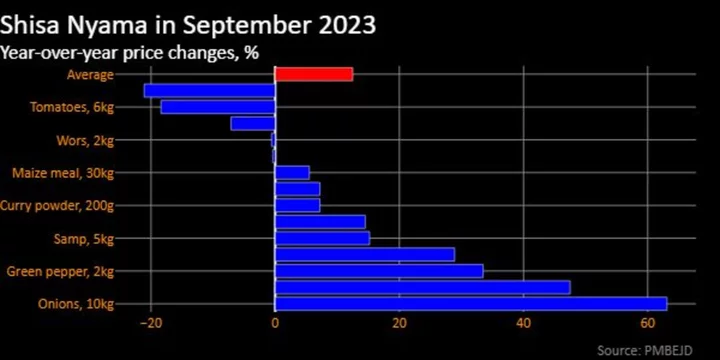Celeste Moyanga, who sells barbecued chicken feet from her stall on a Johannesburg sidewalk, has resorted to buying one or two onions at a time from other street traders as prices of fresh produce skyrocket.
Going to “a supermarket to buy onions where they weigh them?” she said. “Forget it. I don’t remember the last time I did.”
The cost of onions has soared 63% over the past year, the biggest increase of any single ingredient in Bloomberg’s Shisa Nyama Index.
Crunching data from the Pietermaritzburg Economic Justice and Dignity group, the gauge tracks the prices of key ingredients in a traditional barbecue consumed in South African townships, including potatoes, cooking oil, corn meal, carrots, tomatoes, frozen chicken, beef and wors — a sausage made from ground meat offcuts. The overall index rose 12.5% last month, up from 12.4% in August.
To compile its survey, the PMBEJD’s data collectors track the prices of 44 food items on the shelves of 47 supermarkets and 32 butcheries that target the low-income market in the greater areas of Johannesburg, Durban, Cape Town, Pietermaritzburg, Springbok in the far northwest and the far north-eastern town of Mtubatuba.
Data from South Africa’s statistics agency show inflation has largely slowed over recent months and has been in the central bank’s 3% to 6% target band since June. Food inflation has remained elevated, moderating to 8.2% in August from 10% the previous month.
Moyanga said while she used to spend 300 rand ($15.94) a week on household groceries, it now costs her 500 rand or more to buy just rice, corn meal, cooking oil and 5 kilograms (11 pounds) of frozen chicken portions. She pays about 1.50 rand for an onion and between 2 rand and 2.50 rand for a single egg.
Central bank Governor Lesetja Kganyago said in a Bloomberg TV interview this week that the bank has more work to do to rein in inflation, with higher food and oil costs posing risks to the outlook.
Data from the Bureau of Food and Agricultural Policy shows that the volatility in demand for fresh produce has exacerbated price increases stemming from lower output.
Gift Mlilo, a Johannesburg-based welder, said he mainly eats corn meal and that his vegetable intake is largely restricted to cabbage and tomatoes — which the index shows have fallen in price over the past year.
“We are in deep trouble,” he said. “Employers don’t pay well anymore and there is no price regulation. Everyone charges what they want, and what will you do if you want to buy food? You have no choice but to buy.”
--With assistance from Jogi Sidhu.

